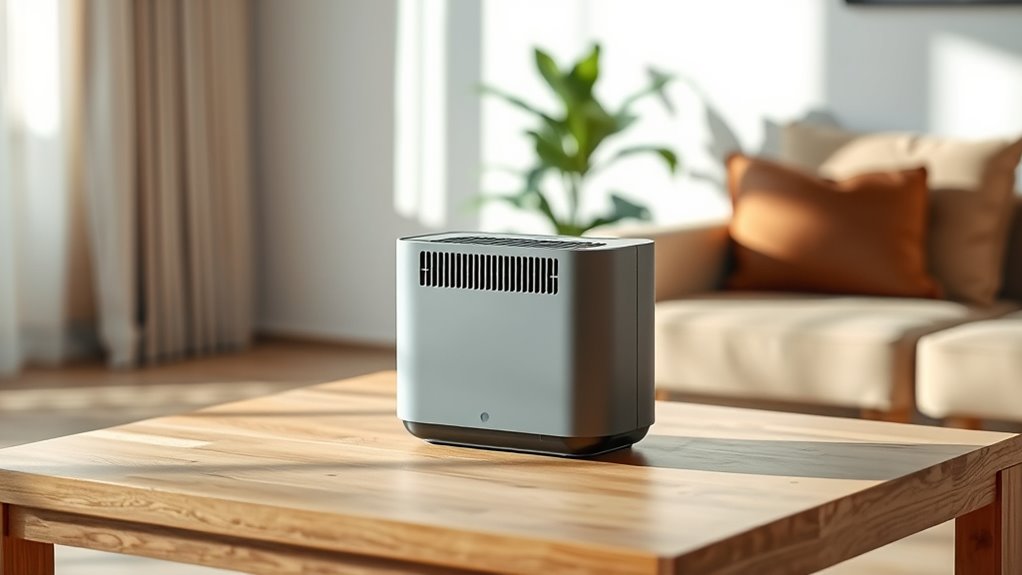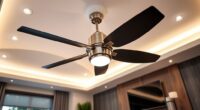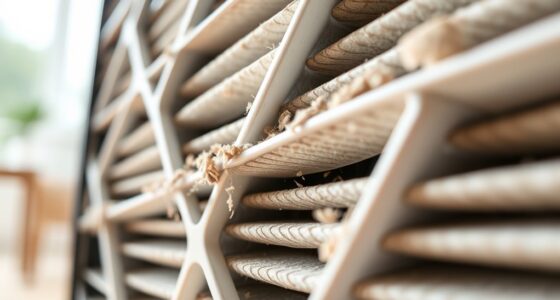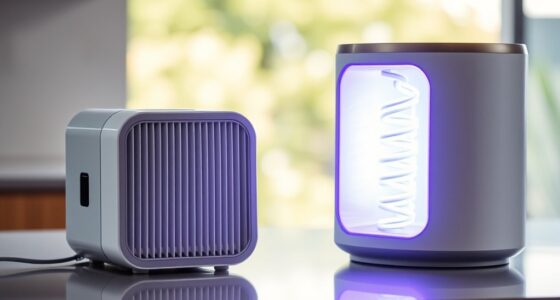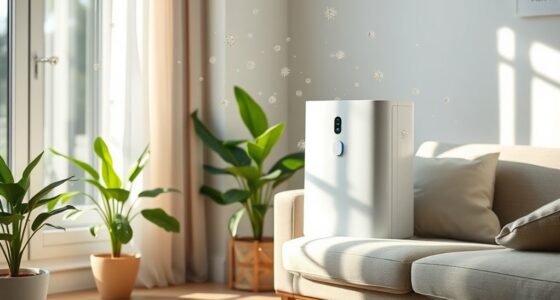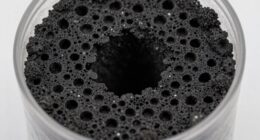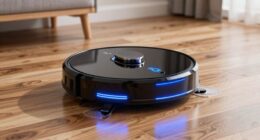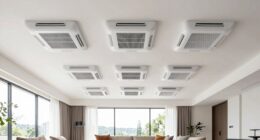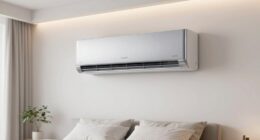The ideal noise level for an air purifier depends on your environment and personal comfort. Generally, 20-30 decibels is considered very quiet, perfect for bedrooms or quiet spaces, while 40-50 decibels may be acceptable during daytime or in busier areas. Lower fan speeds are quieter but may reduce airflow, so finding a balance is key. If you want to learn more about choosing a quiet air purifier, keep exploring how different models perform.
Key Takeaways
- Noise levels of 20-30 dB are considered very quiet, ideal for sleeping or quiet environments.
- Adjustable fan speeds allow users to select a noise level that balances air flow with comfort.
- Personal preferences and environment type influence what noise threshold is acceptable.
- Most air purifiers produce acceptable noise at lower settings, with louder sounds at higher speeds.
- Testing or reviewing decibel ratings helps determine if a purifier’s noise level meets individual quietness standards.

When choosing an air purifier, one important factor to consider is its noise level, since loud operation can disrupt your daily routine or sleep. You’ll want a device that runs quietly enough to blend into your environment without causing annoyance. To determine what’s acceptable, many people look at sound comparisons across different models. These comparisons reveal how loud a purifier gets at various settings, giving you a clearer idea of its noise profile. Some models operate at near silence on low settings, producing only a gentle hum, while higher settings can be noticeably louder. Your personal preferences play a big role here—if you’re sensitive to noise or plan to use the purifier in a bedroom, you might prioritize units that operate at minimal sound levels.
User preferences vary widely when it comes to noise. Some folks don’t mind a faint background hum, considering it a small trade-off for cleaner air. Others prefer absolute silence, especially during sleep, and may opt for ultra-quiet models or even those with sleep modes designed to minimize noise. It’s essential to think about your environment and how much noise you’re willing to tolerate. For example, if you work from home or often read in your living room, a quieter device will be less distracting. Conversely, in a busy household or a garage workshop, a slightly louder purifier might not be as much of an issue. The key is balancing your need for clean air with your comfort level regarding noise.
Many manufacturers now provide decibel ratings for their air purifiers, which helps you compare sound levels directly. Typically, a purifier producing around 20-30 decibels is considered very quiet—roughly equivalent to a whisper or rustling leaves. Models that reach 40-50 decibels are louder but still acceptable for many users during daytime use. Some high-end units even feature adjustable fan speeds, allowing you to set the noise level based on your activity. Remember, the lowest setting might be perfect for sleeping, but on higher speeds, the noise can increase markedly. Your choice ultimately depends on how you prioritize quietness versus airflow. Additionally, understanding the impact of noise levels on user experience can help you make a more informed decision.
Many air purifiers offer decibel ratings, with 20-30 dB being very quiet and adjustable speeds for tailored noise levels.
In the end, understanding sound comparisons and considering your user preferences will help you select an air purifier that fits seamlessly into your lifestyle. If noise is a major concern, look for models with strong reviews on their quiet operation, and don’t hesitate to test a unit if possible. Finding the right balance between effective air cleaning and a peaceful environment will make your experience much more satisfying.
Frequently Asked Questions
How Does Room Size Affect Air Purifier Noise Levels?
Room size influences your perception of air purifier noise levels. In larger rooms, the noise may seem quieter because sound dissipates over a bigger space, making it less noticeable. Conversely, in smaller rooms, the same noise can feel louder and more disruptive. So, when choosing an air purifier, consider your room size to guarantee the noise level stays comfortable and doesn’t interfere with your daily activities.
Are Higher Noise Levels Linked to Better Air Purification?
You might wonder if higher noise levels mean better air purification. Generally, noise perception depends on sound frequency and volume, but louder isn’t always more effective. Some purifiers use higher fan speeds that create more noise, which can improve air circulation and filtration. However, ideal purification isn’t solely about noise; it’s about the balance between sound frequency, airflow, and filtration power. So, louder doesn’t necessarily mean cleaner.
Do Noise Levels Vary Between Different Air Purifier Brands?
Think of air purifier noise levels like a symphony—some brands play softer tunes. Yes, noise levels do vary between brands, influenced by their reputation for quality. You should check user reviews to find which brands offer quieter operation. Generally, reputable brands prioritize low noise to keep your space peaceful. So, don’t settle for loud models; look for those with positive feedback on quietness for a better experience.
Can Noise Levels Impact Sleep Quality When Using an Air Purifier?
You might find that the noise level of your air purifier affects your sleep quality. If it’s too loud, it can cause sleep disruption, making it harder to fall asleep or stay asleep. To minimize this, consider soundproofing techniques or choosing a purifier with a quieter setting. Ensuring your air purifier operates silently or near-silent helps create a peaceful sleep environment, so you wake up feeling refreshed.
Are There Noise-Reducing Features Available in Air Purifiers?
Imagine you’re sleeping peacefully, and your air purifier operates quietly. Many models feature sound insulation and vibration dampening to reduce noise. For example, a case study shows a purifier with advanced insulation technology minimizes vibrations, making it almost silent. These features help guarantee noise levels stay low, creating a more restful environment. If you prioritize quiet operation, look for air purifiers that highlight sound insulation and vibration dampening in their design.
Conclusion
When choosing an air purifier, consider how quiet is quiet enough, how comfortable is comfortable enough, and how peaceful is peaceful enough. By understanding noise levels, you can find a device that runs smoothly, functions quietly, and fits seamlessly into your space. Prioritize your comfort, your peace of mind, and your environment’s tranquility. Ultimately, the right purifier is the one that balances power with quietness, performance with peace, and convenience with calm.
